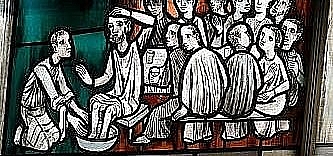
In his book “Peculiar Treasures,” Frederick Buechner calls the story of Jesus and Zaccheus in Luke’s gospel, “the best and oldest joke in the world,” and it’s always been one of my favorites.
Chief among those reasons is a short little ditty of a song that I (and so many others who grew up in Protestant traditions) learned as children:
Zaccheus was a wee little man, a wee little man was he.
He climbed up in a sycamore tree for the Lord he wanted to see.
And as the savior passed that way he looked up in the tree,
AND HE SAID: “Zaccheus, you come down!” (at this we shook our little pointer fingers)
“For I’m going to your house today. For I’m going to your house today.”
I loved the song for its simple melody (If you know it, it’s now stuck in your head for the rest of the day. You’re welcome.) and for its simple hand motions that helped us learn it and bring the story alive in our young hearts. At the time, I think it resonated because I was always short for my age and always quick to climb the plum tree in my backyard in North St. Louis to get a better view of my surroundings. I could relate.
What I didn’t really understand at the time, of course, was the larger lesson Jesus was teaching the crowd by inviting himself to Zaccheus’ house. Zaccheus, short in stature indeed, was the right-hand man of the local tax collector, the “Jewish legman for the Roman IRS,” Buechner writes. He was not well liked and for good reasons. Nobody likes the taxman, and especially ones like Zaccheus who pocketed more than his fair share.
Jesus is on his way to Jericho and, as was becoming more and more the norm, the crowds lined the way to catch a glimpse of him, hear one of his puzzling parables or perhaps be healed or at least witness a healing. Zaccheus did what he did best; he wormed his way into the best position possible to take advantage of the situation at hand. He climbed the nearest tree. If he thought he’d get off with nothing else than whatever is the ancient-day equivalent of a selfie with a local celebrity, he was wrong. Jesus spotted him in the tree — this seemingly insignificant, undersized runt of a local criminal — and said, “Yeah, you. Let’s go to your house. I’m hungry.”
“It is not reported how Zaccheus got out of the sycamore,” Buechner writes, “but the chances are good that he fell out in pure astonishment.”
If he was astonished, imagine the look on the faces of the “good” people around him —the ones who prayed in the temple all the time, the ones who paid their taxes and tithes, the ones who had been hoping and praying for this Messiah. Perhaps this was the one and now was the time. But…then…he calls Zaccheus down from the tree and they begin to think he’s not the one after all. He couldn’t possibly be.
After all, he eats with tax collectors. He cavorts with Samaritan women and comes to the defense of prostitutes. He welcomes strangers and immigrants and feeds the hungry. He heals without prior authorization. He looks first with love and corrects later and if necessary. He sees beyond our national origins straight into our hearts. He’s surely a lunatic, they thought.
“The unflagging lunacy of God,” Buechner writes. “The unending seaminess of man. The meeting between them that is always a matter of life or death and usually both.”
Ask yourself in silence: What images of Jesus and God do I need to let go of in order to meet the real Jesus? What tree do I need to climb down from?



